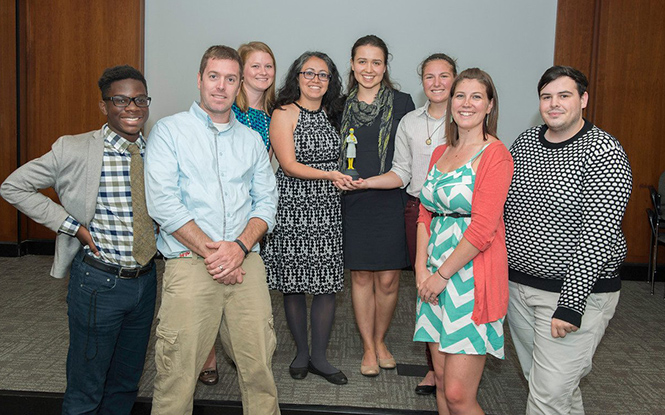By Amarpreet Grewal and Anna Sinova
On August 20, Olga Zamudio Prieto from Dr. Dieter Bromme’s Laboratory at the CBR was one of the four finalists who received a fully paid trip to Philadelphia for the American Chemical Society (ACS) Chemistry Championship Finals.
The aim of the Chemistry Champions Contest is to record a short video of one’s chemistry research or a concept to engage the public, raising scientific literacy and providing more support for science. Therefore, the challenge lies in making the video understandable to a non-scientist audience.
Olga learned about the ACS Chemistry Champions Competition while watching the ACSReactions Youtube channel and she decided to try herself out. “I think the ACS Chemistry Champions Competition doesn’t have as much promotion as it should”- she shared.
She started with creating a 2.5 minute video about the Green Fluorescent Protein (GFP).
Although her research is on proteases, she decided that a video about GFP as a science tool would be more eye-catching and grab the attention of an amateur scientist audience. For this video, she even created original images, while her husband helped with filming and editing.
Competing against many applicants, Olga and 11 other entrants were selected to continue to the second round, where they were challenged to excite the listeners about a unique element from the periodic table. Olga received the element Arsenic and created a fun video discussing its history, including famous deaths from arsenic poisoning, controversial history of its use in household products, and finally its current applications. Olga’s excellent video was selected to move to the next level of competition with seven others to the ACS Semi-Finals.
The Semi-Finalists received a fully paid trip to the ACS Headquarters in Washington, DC for a two-day science communication workshop. “They gave us social media advice, we did improv exercises and we got tips and feedback on the design and visuals for our presentation, as well as for our on-stage delivery. I learned a lot from the experience, so I felt I’d already won even before the finals were even a possibility.”- recalled Olga about Round 3.
The Semi-Finals involved a 3 minute live performance based on the training received. The contestants were judged on their performance and original video by an audience varying from those who do not have science background to those who hold a PhD. Only 4, with Olga among them, were selected to continue on the journey to the ACS Chemistry Championship Finals held at the Franklin Institute in Philadelphia.
The Finals involved a series of live shows with a variety of audiences. They participated in an annual outreach event at the Franklin Institute, giving their presentations to an audience of families and kids. The last event was held at The Fields Sports bar with attendees from the ACS National Meeting. Three science communication professionals judged the competition: Andy Brunning the author of Compound Interest, Raychelle Burks from St. Edwards’s University, also known as DrRubidium, and Jayatri Das, Chief Bioscientist at The Franklin Institute.
Olga was awarded second place at the ACS Chemistry Championship Finals! As runner-up, she was invited to be a guest at the ACS webinar. The winner, Mallory Hinks from the University of California, received a trip to Washington, DC to network with professional science communications staff at ACS and a 3D-printed Chemistry Champions trophy.
“Overall, the experience was really fun, I could share something I’m passionate about and on top of it, I was rewarded! At CBR we are lucky to have the Knowledge Translation team, where you can explore and develop different communication skills. At the beginning, I wasn’t confident, because English is my second language, but I’m so glad I didn’t hear my internal saboteur! I would invite any undergraduate or graduate student to participate in the next year’s championship. You can participate as young as 18 years old and up to 35 years of age.”
Science communication skills are helpful in any stage of one’s career, whether it is a research seminar presentation, a public lecture, a business pitch, or a room full of elementary kids. If you would like to learn more about participating in ACS Chemistry Championship, visit their website.



